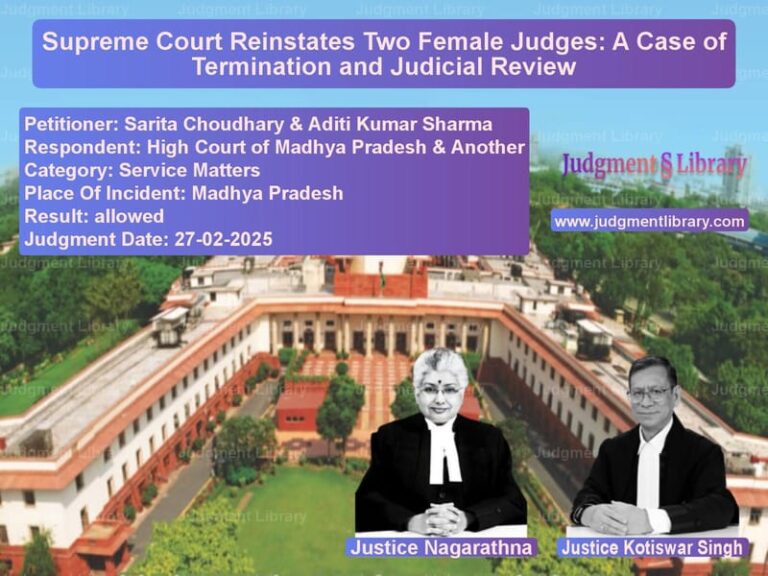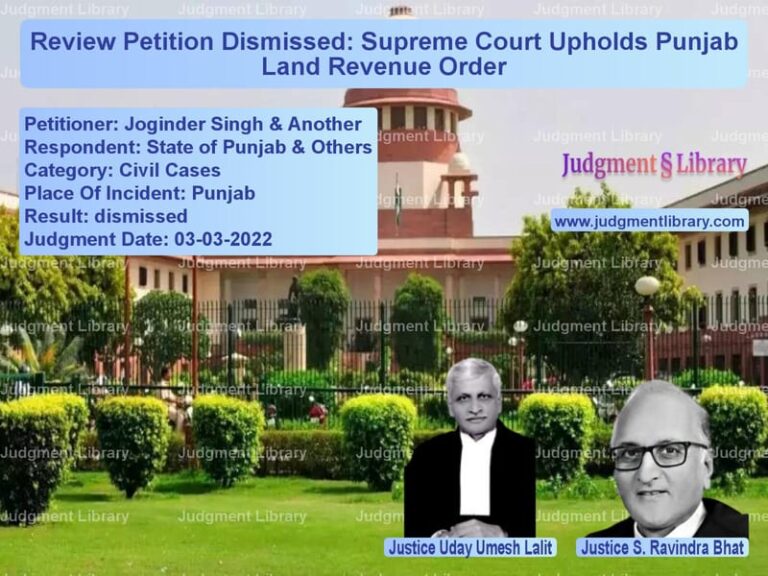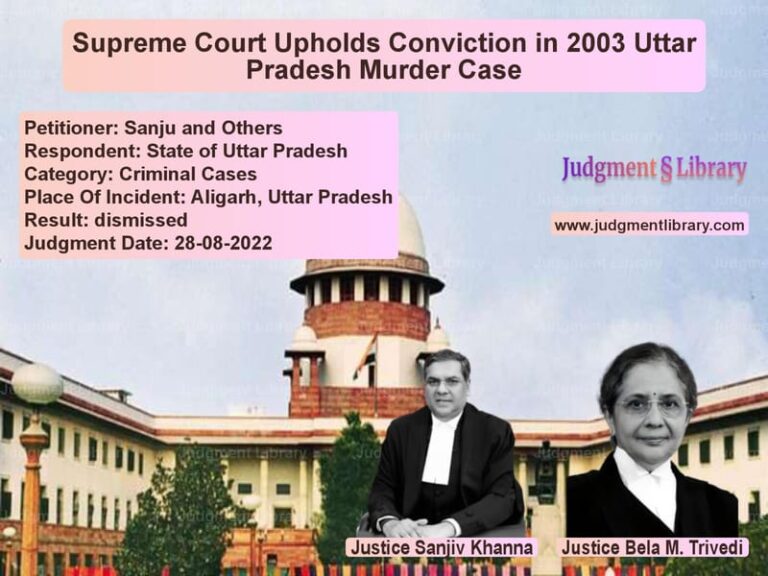Supreme Court Upholds Fine Payment Condition in Bail Order for Convicted Official
The case of Satyendra Kumar Mehra v. State of Jharkhand deals with the issue of fine payment as a condition for bail. The Supreme Court dismissed the appeal filed by the appellant challenging the Jharkhand High Court’s order that required him to deposit the fine amount before granting suspension of sentence.
Background of the Case
The appellant, Satyendra Kumar Mehra, was convicted in R.C. Case No. 68(A) of 1996, a case involving multiple accused, including political figures, in a large-scale corruption scandal. The trial court convicted him under:
- Section 120-B read with Sections 420, 467, 468, and 471 of the IPC
- Sections 13(1)(c) and 13(2) of the Prevention of Corruption Act, 1988
The appellant was sentenced to five years of rigorous imprisonment along with a fine of Rs. 25,000 for each count, with default imprisonment of three months for non-payment.
He then filed a criminal appeal (No. 176 of 2018) before the Jharkhand High Court, along with an application seeking suspension of sentence. The High Court granted bail but imposed the condition that the fine amount had to be deposited in court.
Dissatisfied with this condition, the appellant approached the Supreme Court, arguing that the fine payment should be automatically stayed under Section 357(2) of the Criminal Procedure Code (CrPC) since the appeal was pending.
Petitioner’s Arguments
The appellant, through his counsel, contended that:
- Under Section 357(2) CrPC, the fine payment should not be enforced while an appeal is pending.
- The High Court erred in directing the deposit of the fine amount as a condition for granting bail.
- As per precedent set in Dilip S. Dahanukar v. Kotak Mahindra Co. Ltd., the fine payment should be automatically stayed in case of an appeal.
- The direction to deposit the fine amount placed an unjust burden on the appellant while his appeal was still being adjudicated.
Respondent’s Arguments
The State of Jharkhand opposed the plea, arguing that:
- Section 357(2) CrPC applies only to compensation payments, not to fines imposed as part of a criminal sentence.
- The High Court acted within its discretion while setting conditions for bail.
- The Supreme Court had upheld similar conditions in the past, such as in Stanny Felix Pinto v. Jangid Builders Pvt. Ltd.
- The appellant’s reliance on the Dilip Dahanukar case was misplaced as that case dealt with compensation under Section 357(3) CrPC, not fines imposed as part of a sentence.
Supreme Court’s Observations
The Supreme Court analyzed Section 357 CrPC and made the following key observations:
1. Section 357(2) Applies Only to Compensation
The Court ruled that the automatic stay under Section 357(2) CrPC applies only when a fine is meant to be used for compensation. In this case, there was no such compensation directive.
“Section 357(2) CrPC has no application when the trial court has imposed a fine as part of the sentence, and no direction has been given for compensation payment.”
2. Discretion of the High Court in Bail Matters
The Court emphasized that High Courts have wide discretionary powers in granting bail, including imposing conditions.
“The High Court is vested with the discretion to impose conditions while suspending the sentence, and directing the deposit of a fine amount does not violate any legal principle.”
3. Fine Payment and Appeal Process
The Court distinguished between compensation and fines, ruling that:
“The purpose of Section 357(2) CrPC is to prevent premature compensation payments before the appeal process concludes, but this does not extend to staying the payment of fines imposed as punishment.”
4. Reference to Precedents
The Court referred to previous rulings, particularly:
- Stanny Felix Pinto v. Jangid Builders Pvt. Ltd. – where the Supreme Court upheld a High Court’s order requiring partial fine payment as a bail condition.
- K.C. Sareen v. CBI – which emphasized that appellate courts can suspend sentences, but conditions may be imposed.
Supreme Court’s Final Verdict
The Supreme Court dismissed the appeal and upheld the Jharkhand High Court’s order, ruling:
- The appellant must deposit the fine amount as directed.
- There was no violation of Section 357(2) CrPC.
- The High Court’s condition for suspension of sentence was legally valid.
- The appeal was without merit and was dismissed.
Key Takeaways
- Section 357(2) CrPC does not grant an automatic stay on fines; it applies only to compensation orders.
- High Courts have the authority to impose conditions when granting bail.
- Payment of a fine is part of the sentence and is not subject to automatic stay during the appeal.
- The Supreme Court upheld a strict interpretation of the law, ensuring that fines imposed as punishment are not easily bypassed.
Conclusion
This judgment reinforces the principle that fine payments as part of a sentence cannot be automatically stayed by filing an appeal. The Supreme Court’s ruling affirms that High Courts have the discretion to impose conditions while granting bail, ensuring that convicted individuals do not evade their financial penalties through procedural loopholes.
Petitioner Name: Satyendra Kumar MehraRespondent Name: State of JharkhandJudgment By: Justice Ashok BhushanPlace Of Incident: JharkhandJudgment Date: 23-03-2018
Don’t miss out on the full details! Download the complete judgment in PDF format below and gain valuable insights instantly!
Download Judgment: Satyendra Kumar Mehr vs State of Jharkhand Supreme Court of India Judgment Dated 23-03-2018.pdf
Direct Downlaod Judgment: Direct downlaod this Judgment
See all petitions in Fraud and Forgery
See all petitions in Extortion and Blackmail
See all petitions in Money Laundering Cases
See all petitions in Judgment by Ashok Bhushan
See all petitions in dismissed
See all petitions in Quashed
See all petitions in supreme court of India judgments March 2018
See all petitions in 2018 judgments
See all posts in Criminal Cases Category
See all allowed petitions in Criminal Cases Category
See all Dismissed petitions in Criminal Cases Category
See all partially allowed petitions in Criminal Cases Category







